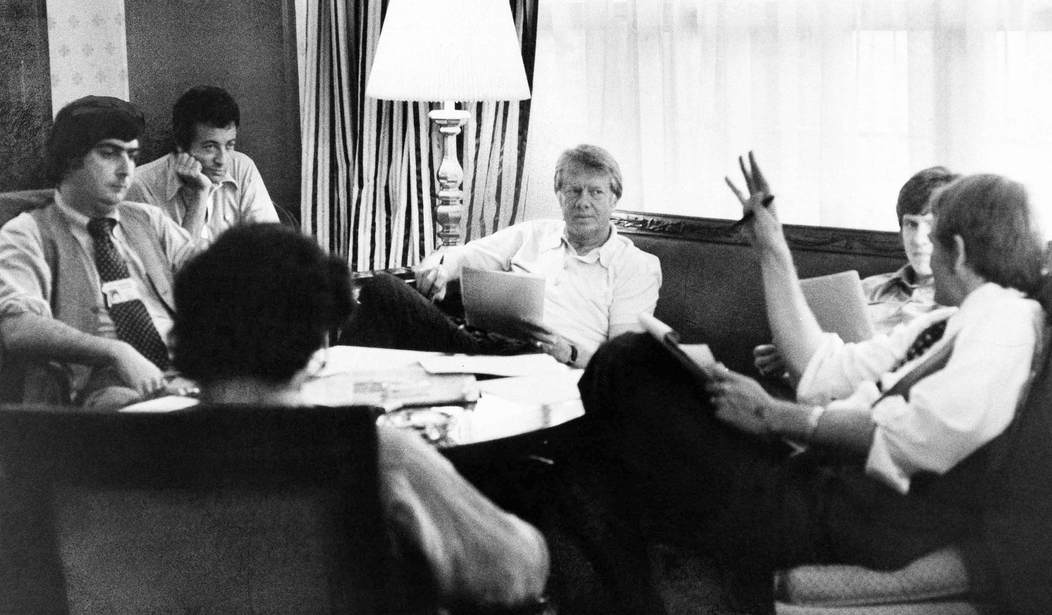“Who controls the past controls the future: who controls the present controls the past,” wrote George Orwell in 1984, and CNN was taking notes. Sunday night its “Race for the White House” series focused on Jimmy Carter, who, CNN tells us, “didn’t look or act like a typical commander-in-chief, but he put his morals above politics. President Jimmy Carter gets upstaged and outplayed by Republican Ronald Reagan on #RaceForWH.”
It’s tempting to think of this as a CNN parable for the Democratic candidates vying to face Trump. Instead of the Carter of history – inept, incompetent, sanctimonious, antisemitic, and in way over his head – we get the Carter of CNN myth: a man just too good for the political arena, who because of that very goodness got beaten by the vicious, amoral Ronald Reagan.
The forthcoming Rating the Presidents: An America-First Look At Who’s Best, Who’s Overrated, and Who Was An Absolute Disaster (which you can preorder here) peels back the CNN whitewash. Carter is even one of the three presidents on the book’s cover, grinning his toothy grin beside “and Who Was An Absolute Disaster.” There are many good reasons for that.
One is Carter’s handling of the energy crisis, which foreshadowed Leftist hysteria about global warming. On April 18, 1977, with inflation and unemployment spiraling ever upward, Carter went on television in the guise of an apocalyptic prophet crossed with a scolding schoolmarm, telling Americans with a touch of condescension: “Tonight I want to have an unpleasant talk with you about a problem that is unprecedented in our history. With the exception of preventing war, this is the greatest challenge that our country will face during our lifetime.” He was speaking of the energy crisis, which, he warned, “has not yet overwhelmed us, but it will if we do not act quickly.”
Carter-the-prophet-of-doom informed Americans that the sky was falling: “The oil and natural gas that we rely on for 75 percent of our energy are simply running out….Unless profound changes are made to lower oil consumption, we now believe that early in the 1980s the world will be demanding more oil than it can produce….World consumption of oil is still going up. If it were possible to keep it rising during the 1970s and 1980s by 5 percent a year, as it has in the past, we could use up all the proven reserves of oil in the entire world by the end of the next decade.”
Carter-the-peevish-schoolmarm told Americans it was all their fault: “We must not be selfish or timid if we hope to have a decent world for our children and our grandchildren…. Each American uses the energy equivalent of 60 barrels of oil per person each year. Ours is the most wasteful nation on Earth. We waste more energy than we import. With about the same standard of living, we use twice as much energy per person as do other countries like Germany, Japan, and Sweden.”
Echoing Lyndon Johnson’s War on Poverty, Carter created another unwinnable war against a nebulous foe: “This difficult effort will be the ‘moral equivalent of war,’ except that we will be uniting our efforts to build and not to destroy.”
Carter moved quickly to save the world, counterintuitively prohibiting exploration to find new sources of oil and gas in the Western states. He also ordered oil producers to focus on home heating oil rather than on gasoline; Americans consequently had to wait in lengthy lines, often for hours on end, to get gas. Adding insult to injury, President Carter proposed a stiff new federal tax on gasoline, of fifty cents on the gallon, but wasn’t able to get this through Congress. He was able to get through his National Energy Act, which taxed low-mileage cars and gave tax credits to people for using solar and other alternative forms of energy (Carter did his part, having solar panels installed in the White House). On July 10, 1979, he even ordered that public buildings not set their air conditioners below a sweltering 78 degrees, and in the next winter not to raise their heat above 65 degrees.
Above all, Carter faced this supposedly civilization-threatening crisis by creating yet another federal agency, the cabinet-level Department of Energy, to coordinate further action to save the nation and the world from the catastrophe Carter sketched out in April 1977.
But the whole endeavor was built on sand: there was actually no energy crisis. The world’s oil reserves did not run out in the 1980s, and not because Jimmy Carter saved the day by winning his “moral equivalent of war.” The real problem was one that Carter only made worse: oil companies were so beset with restrictions and regulations that they couldn’t take adequate steps to find new oil supplies. Carter’s successor changed that, and the days of the energy crisis were over, at least until apocalyptic climate hysteria of a different kind became the centerpiece of later Democratic presidents’ efforts to assert even more federal control over the lives of Americans.
Then there were the Camp David Accords – supposedly Carter’s big achievement. In September 1978, President Carter invited Egyptian President Anwar Sadat and Israeli Prime Minister Menachem Begin to the presidential retreat of Camp David to end the protracted conflict between the two countries. Sadat told his aides: “What we are after is to win over world opinion. President Carter is on our side. This will end in Begin’s downfall!” He was right. Carter told Sadat: “I will represent your interests as if they were my own. You are my brother.” A jubilant Sadat told his aides that “poor naïve Carter” was ready to pressure Begin into giving Egypt everything it wanted.
Sadat was right. “Mr. Prime Minister,” Carter told Begin icily after Sadat presented his proposals, “that is not only the view of Sadat, it is also the American view – and you will have to accept it.” Angrily he repeated, “You will have to accept it.” These included Israel’s withdrawal from the Sinai Peninsula, which Israel had occupied after Egypt attacked it in 1967. While territorial expansion at the expense of an aggressor nation had been recognized as a right of the victor in a war from time immemorial, Carter was determined that it would not apply to Israel. He also wanted Israel to acknowledge that it was carrying out an illegitimate occupation of Palestinian land. He complained to Begin: “Listen, we’re trying to help you bring peace to your land. You would have us feel that we are going out of our way deliberately to be as unfair to Israel as possible.” Indeed.
Carter has received a great deal of praise, as well as a Nobel Peace Prize, for the Camp David Accords, but in reality, they accomplished little. The final agreement had Israel making substantial territorial concessions in exchange for promises that Egypt would not attack Israel, which the Egyptians kept because U.S. foreign aid was made contingent upon peace. Other than that, the Accords brought no peace to the Middle East. They legitimized the existence of the “Palestinian” people, a propaganda invention of the KGB in the 1960s, and advanced the claim that Israel was occupying Palestinian territory to which only Israel had a legitimate claim. Carter, after his presidency, has written several books about the Israeli-Palestinian conflict that have brought him charges of anti-Semitism; the deep bias of the Camp David Accords strongly suggests that even at that time he had an animus toward Israel. His palpable lack of sympathy for the Jews of Israel, who are permanently under siege, continues to this day.
Carter’s betrayal of another American ally, the Shah of Iran, was even worse. As protests against the Shah engulfed Iran, Carter abandoned him to his fate. Many in the Carter administration admired the Ayatollah Khomeini, the Islamic leader who was at the center of the protests.
On January 4, 1979, Carter told French President Valery Giscard d’Estaing that the U.S. was abandoning its ally, withdrawing all support from the Shah and backing Khomeini. “I was horrified,” recalled Giscard. “The only way I can describe Jimmy Carter is that he was a ‘bastard of conscience.’” On January 16, 1979, the Shah and his family left Iran. The Islamic Republic of Iran was established soon after.
Then on October 23, 1979, Carter reluctantly allowed the gravely ill Shah to enter the U.S. for medical treatment. On November 4, a group calling itself Muslim Students Following the Imam’s Line (that is, Khomeini’s line) retaliated by entering the U.S. embassy compound in Tehran and taking hostage the skeleton staff of sixty-six that was still serving there after the fall of the Shah.
Khomeini sneered: “Jimmy Carter is too much of a coward to confront us militarily.” Carter did, however, mount Operation Eagle Claw to rescue the hostages in April 1980, which was a miserable failure; a crash killed eight U.S. military personnel. Fifty-two hostages remained in captivity for 444 days. They were freed on January 20, 1981, the day Reagan took office.
The hostage crisis, as well as the abject failure and apparent amateurishness of the rescue operation, epitomized the Carter administration’s impotence in the face of repeated provocations from the nascent Islamic Republic of Iran. One of Reagan’s campaign themes in the 1980 election was that he would deal with the Iranians much more firmly than Carter had, and the Iranians clearly respected Reagan in a way they did not respect Carter. This was ironic in light of the fact that the Islamic Republic owed its very existence to Carter’s betrayal of the Shah. In a very real sense, Jimmy Carter is the Father of the Islamic Republic of Iran, a rogue regime that has viciously oppressed its own people while allying with and financing jihad terror groups around the world.
The recent tensions with the Islamic Republic show that America is still paying the price for the damage Carter wrought during his presidency. He effectively lost his bid for reelection on July 15, 1979, when he once again commandeered the nation’s television screens in order to scold and hector Americans in what came to be known as his “malaise” speech, although he did not use that word. “It’s clear,” Carter claimed, “that the true problems of our Nation are…deeper than gasoline lines or energy shortages, deeper even than inflation or recession.” He asserted: “All the legislation in the world can’t fix what’s wrong with America.” What was really threatening the nation, he said, was “a crisis of confidence. It is a crisis that strikes at the very heart and soul and spirit of our national will. We can see this crisis in the growing doubt about the meaning of our own lives and in the loss of a unity of purpose for our nation. The erosion of our confidence in the future is threatening to destroy the social and the political fabric of America.”
What he did not address was the extent to which his maladroit handling of the presidency was responsible for that crisis. The malaise began to lift when he was voted out of office. He was a President only CNN could love.
Robert Spencer is the director of Jihad Watch and a Shillman Fellow at the David Horowitz Freedom Center. He is author of 19 books, including the New York Times bestsellers The Politically Incorrect Guide to Islam (and the Crusades) and The Truth About Muhammad. His latest book is The Palestinian Delusion: The Catastrophic History of the Middle East Peace Process. Follow him on Twitter here. Like him on Facebook here.










Join the conversation as a VIP Member